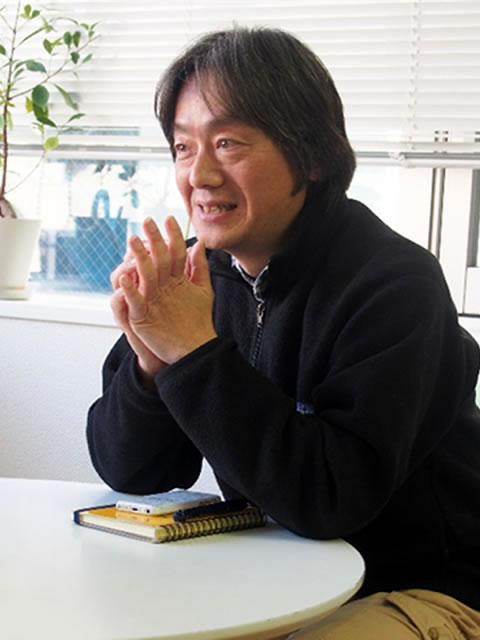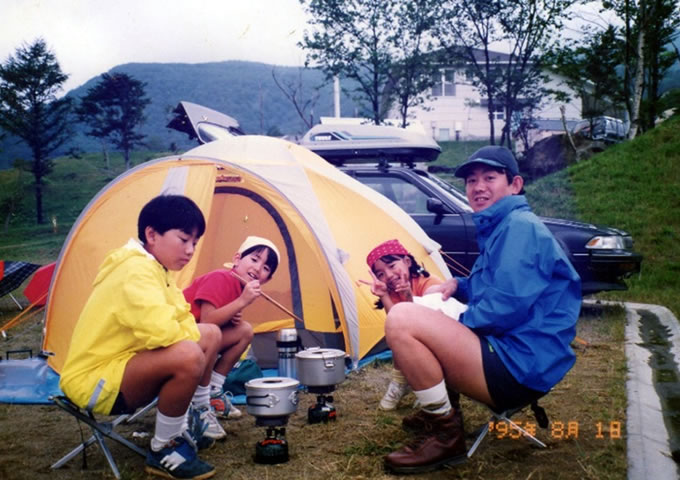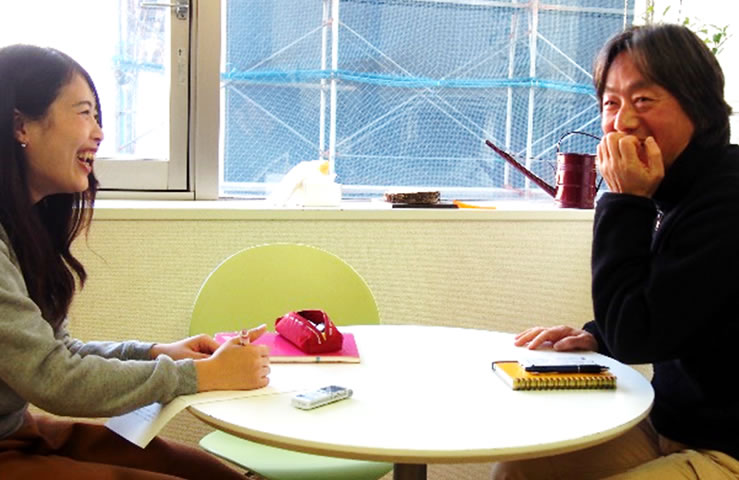[Original by Haruka SHIMIZU, 2015 Public Relations Intern (April 28, 2016); Translated by Y. Nakamura/A. Senkoff]
[*Mr. Yokoyama is currently in charge of the Member Assistance as of April 2019.]
Hello, my name is Haruka Shimizu. I am a PR intern for JVC. I will interview today Mr. Yokoyama in charge of the Kesennuma project. He was born in Morioka city, Iwate prefecture, and had grown up in Fukushima and Miyagi prefectures until coming to Tokyo to enter university. How did he become involved in his current job? I am looking forward to talking with him about many things!
I heard you had built up your career as an engineer at an ordinary company. What did you do at university?
When I came to Tokyo from Miyagi prefecture, I firstly lived in a shabby apartment, monthly rent of which was no more than 16,000 Yen. There was no bath, and toilet was shared. I led a so-called poor student life (laugh).
I studied in an electronic telecommunication course, a faculty of technology at university. I produced a vocal synthesizer device for my graduation thesis. Because computer technology had not progressed so much at that time, I simulated throat forms by setting up electric circuits and making voices that were electronically generated. I was deeply absorbed in this task. I sometimes stayed up all night by drawing circuit diagrams because I was really fond of making things by hand and handicraft since I was a child. Even now I got excited at a task like patching up drawing papers for JVC’s events.
By the way, what did you do as part time jobs in your university days?
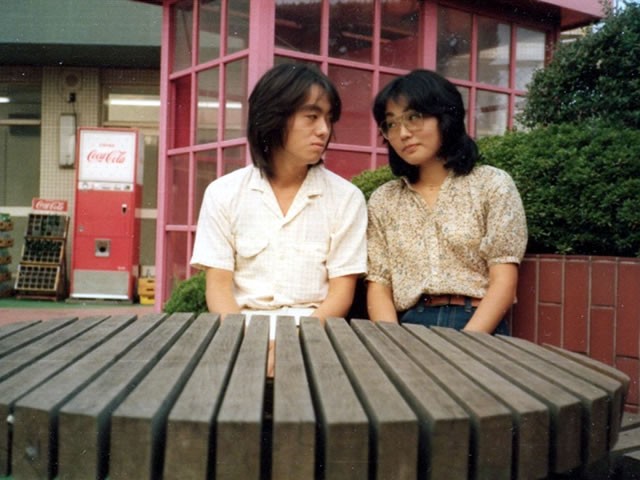
He was slimmest in his student days and lighter than now by more than 10kgs. The girl next to him is actually his wife!
As I was occupied by experiments on Saturdays, I chose a house-moving job, which was recommended by an acquaintance. Therefore, I am good at packing parcels or sorting out cardboard papers. I had an opportunity of destroying a house. It required heavy labor like breaking through walls. Frankly speaking, I was not very good at talking to others. I became aware that “there is nothing impossible if one tries to do it,” only after having experience in working as a salesperson at the age of above 30 years old. Until then I liked talking to THINGS (laugh).
What was your destination after graduation from university?
Most of graduates in the faculty of technology found jobs at manufacturing companies. Similarly, I joined a manufacturing company as a circuit design engineer and began designing electronic circuits. Firstly, I made electronic boards to control machineries by using microcomputers and the like. I could acquire ordinary technical skills after working for five years. Thereafter, I was engaged in making software for about thirty years. I sometimes stayed at a factory from morning to night and worked without stopping.
Where did you live and what did you do when the Great East Japan Earthquake occurred?
I was at a conference room in “Japan Printers’ Institute” in Shintomicho, where I was attending a seminar on ISO with regards to printing colors and data standardization. I wanted to return back to my office at Tokyo Midtown in Roppongi, but the train service was interrupted. I had to walk back there through Ginza and Toranomon. I stayed at my office, and it was after one o’clock in the morning that I came back home. I had grown up in the Tohoku district until graduating from high school. I wanted to do something after reading newspapers and watching TV news about the Great Earthquake. However, I was not able to take any action, because I was so tired even on Saturdays and Sundays after working through weekdays. I took no direct action other than donating, which continuously worried me.
When I felt frustrated day by day, our company was undergoing workforce reduction. Since I was in a management at the time, I found myself in the positions of sacking my subordinates. Instead, I preferred to leave the company by myself and decided to resign.
What did you do after resignation?
I did volunteering activities in Miyagi, Iwate, and Fukushima prefectures by attending the so-called volunteer buses. It was one and a half year after the Great Earthquake but debris still remained, so I helped remove debris from fields. I was simultaneously looking for a new job, and I began to consider a job that was concerned with reconstruction after the earthquake.
However, there were no job offers in the areas damaged by the earthquake since the companies themselves had been affected by the disaster. At that time I was aware of organizations such as NPOs and NGOs that were conducting reconstruction activities in areas devastated by the earthquake. I thought, “There must be a way to become involved!“ I participated in an NGO’s event and came to know about JVC for the first time. Around that time, JVC was accepting applications for the interns and the deadline was very close. Until then, I had been applying for staff openings at other NPOs. However, I could hardly succeed because it was completely different from my previous job and I was older than other candidates. I could not get even interviews in many cases. I found it was hard for middle and old aged people to find a new job after leaving their companies (laugh).
I finally applied for JVC at the last moment. I wanted to be involved in an NGO as an intern, because I thought I could see further possibilities after taking the first step. Incidentally, Ms. Omura, who was an intern for public relations at the same time, applied at the last moment, too (laugh). Even though I was accepted as an intern, I was not assured of a job at JVC after my internship ended. I searched for job offers during my internship and applied for the position of temporary staff to be dispatched to local areas from the Ministry of Restoration. When I was just finishing my one-year internship, JVC unexpectedly opened a position for the management of the Kensennuma project. I applied for it and succeeded.
Did you have any worries when you became a staff member of JVC?
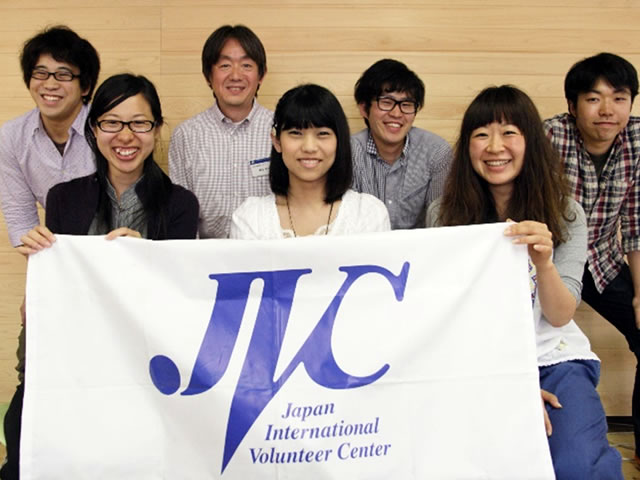
A group photo of the interns of the year 2013. Mr. Yokoyama is the second from the left in the back row, and Ms. Omura is at the right end in the front row. They started to work at JVC at the same time!
When I took an interview at the beginning of my internship, I asked the staff that “I want to know about the whole process of the project; how would it be implemented in a year?” He was so kind to forward me some correspondence emails on the project that I could understand where and how the project was being implemented. This was a good experience for me. I was allowed to attend important meetings and had chances to express my opinions. Since I had such experiences during my internship, I did not have any particular worries about becoming a staff member at JVC. However, it was quite different when I was actually working for JVC. I felt finally accustomed to the work after my third year at JVC.
Do you find something characteristic of JVC after started to work for it?
When I was trying to find a job at various NGOs and collecting information, I found that I had much in common with JVC. At JVC, they did not intend to apply one-sided programs in local areas or conduct activities in accordance with such programs. On the contrary, JVC takes an approach of listening to the voices of local people before establishing concrete programs on the ground. I think that this approach is a very effective way to help local people. I was really attracted to this approach when I was working as an intern. Therefore, when JVC was accepting applications for a management role for the Kesennuma project, a project that I was working on as an intern, I did not hesitate to apply.
It was your great fate. By the way, how do you spend your holidays?
As I wrote in my staff column, I really love walking. I sometimes walk for several hours in holidays before I am aware of it (laugh). I would walk to my office every morning, unless it rains. I am commuting on the Hanzomon Metro Line, and I have the choice of getting off either at the Jimbocho, Otemachi, or Mitsukoshimae stations. I can walk to the JVC office from all these stations in around thirty minutes. Whenever I walk to my office, I am thinking about various things.
You go camping when you have holidays, don’t you?
When my children were small, I began to go to a camp in order to make them feel close to nature. However, since my children are independent these days, I go with my wife to see the natural landscapes and drink while we are there. Kamikochi in Nagano prefecture has been my favorite spot since my old days.
I heard you like watching rugby matches. Do you play rugby by yourself?
I firstly experienced playing rugby in a gymnastic lesson at high school. I started watching rugby matches in my university days, because my university had a strong rugby team. After graduating university, when I was watching rugby matches during my holidays, I thought that I would like to let my children play rugby. I took them to a rugby school in the neighborhood (his daughter is currently active in playing ladies rugby!). There was a tackling practice routine at the rugby school and I helped by receiving tackles. I consequently obtained a certificate of coaching after attending a training course. I was teaching middle school students at that time, but I wanted to play rugby by myself after I became forty years old. First of all, I began to build up my physical strength by running around my neighborhood. I actually participated in a few rugby matches. When I passed the age of forty, I could sensitively see my future; “Unless I don’t try some sports now, I would never play them in the future or in my life.” I don’t like to regret it. I try several sports such as Telemark skiing or snowboarding as long as my physical strength lasts.
My impression after interview
Through this interview I was able to know Mr. Yokoyama more, someone who has sincere thoughts about the Tohoku region where he grew up. Mr. Yokoyama is someone who continues to challenge various things even after he has reached 40 years old. I wanted to be a person like him who acts according to his own interests. He talks frankly to us all the time. Therefore, I was surprised to hear that he was actually not good at talking with others in his old days.
[Notice for the next interview]
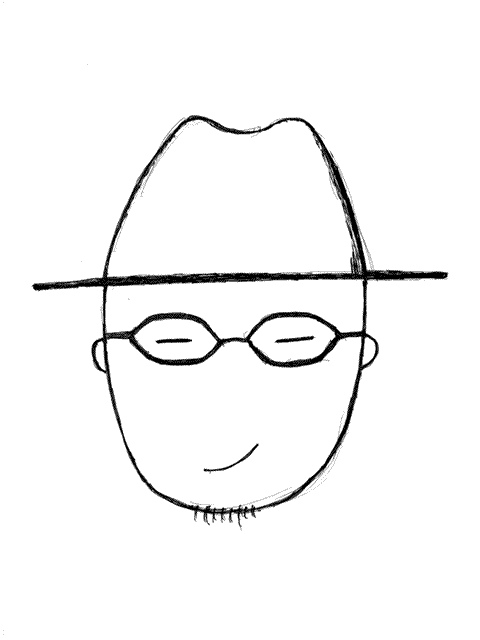
Next time we will interview a staff member, whom Mr. Yokoyama describes as “a seemingly light but actually hearty person.” Please don’t miss it!
Share This:
